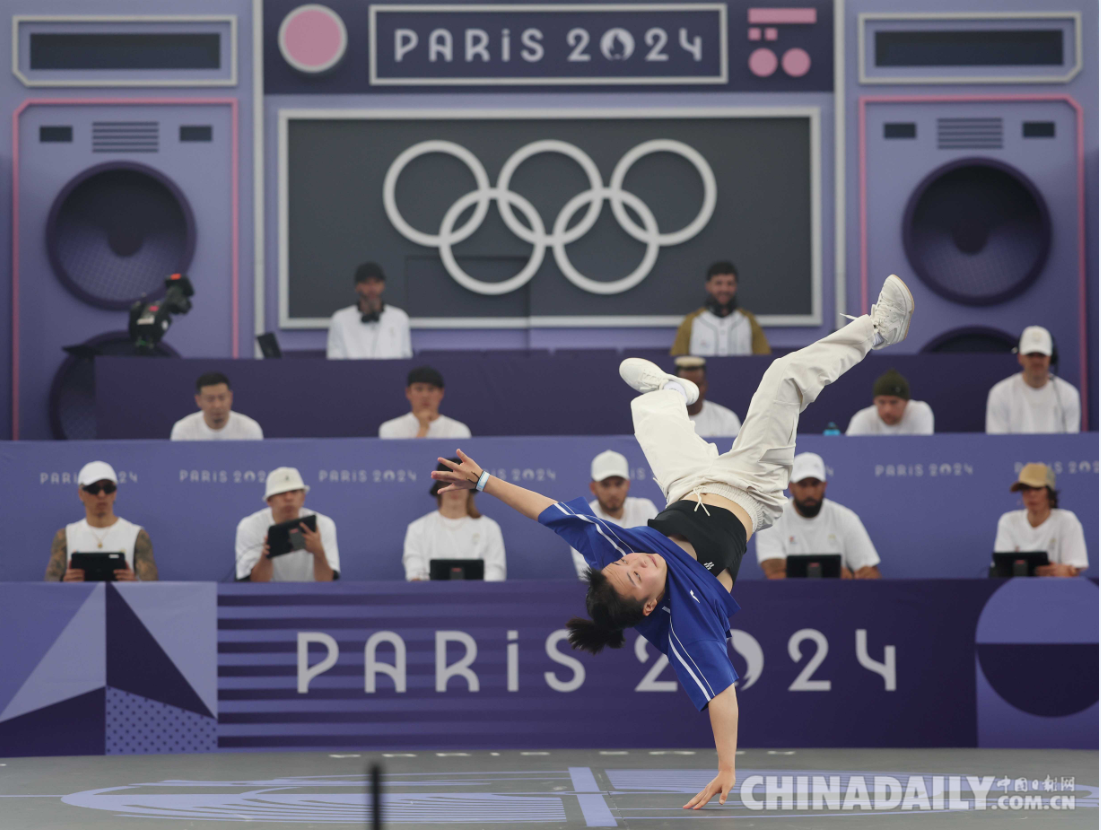B-Girl Ami of Japan takes inaugural Olympic breaking gold, Chinese dancer grabs bronze


PARIS - The atmosphere was electric at Place de la Concorde in Paris as breakdancing - known at Paris 2024 as breaking - made its Olympic debut. In the women's event, Japan's B-Girl Ami (Ami Yuasa) captured the gold medal, while China's B-Girl 671 (Liu Qingyi) clinched the bronze.
B-Girl Ami, donning her oversized hoodie, signature baseball cap, and big earrings, dominated Group C after the round robin, defeating B-Girl Anti of Italy, Morocco's B-Girl Elmamouny, and China's B-Girl Ying Zi (Zeng Yingying), losing only two judges' votes.
The 25-year-old, a two-time world champion (2019 and 2022), advanced to the final after overcoming B-Girl Syssy of France and the Netherlands' B-Girl India in the quarterfinals and semifinals, respectively.
In a tightly contested final, B-Girl Ami secured more votes from the nine judges, all former breakdancing legends, defeating Lithuania's B-Girl Nicka 3-0 with a score breakdown of 16-11.
"I still feel like I'm in a dream," B-Girl Ami remarked after winning gold. Reflecting on the support from her home country, she said, "Before the Games, a lot of people back home cheered me on with 'good luck' and 'enjoy,' and I hope everybody was here."
She emphasized Japan's strong cultural and sporting affinity for breakdancing, adding, "[The atmosphere] was great every weekend at those gyms, both the big ones and the cool smaller ones." While she views breakdancing as her "artistic expression," B-Girl Ami added that she hopes to see the sport grow in global influence.

China's B-Girl 671 finished the round robin with a 2-1 record, her only loss coming against B-Girl India, who had qualified through Friday's Olympic pre-qualifier. The 18-year-old Hangzhou Asian Games gold medalist quickly rebounded, defeating Ukraine's B-Girl Kate 3-0 in the quarterfinals.
Despite losing to B-Girl Nicka in the semifinals, B-Girl 671 found her rhythm in the bronze medal match, securing a 2-1 victory over B-Girl India.
Although she admitted she wasn't "100 percent hyped by the electrifying Olympic atmosphere," B-Girl 671 expressed pride in her performance. "I tried my best," she said, adding, "I was aiming for the gold, but you know what happened in the semifinal. Being able to adjust quickly, pull myself together, and get into my zone for the third-place battle - that's something I'm truly proud of."
Reflecting on her journey to the Olympics, B-Girl 671 shared, "Throughout my preparations for the Olympic Games, I gained a deeper understanding of hip-hop and gradually developed my style."
Having trained for five years to reach the Olympic stage, she also highlighted the growing popularity of breakdancing in China, thanks to its inclusion in the Games.
Fellow Chinese athlete, B-Girl Ying Zi, finished eighth in the one-day competition.
IOC President Thomas Bach, World DanceSport Federation President Shawn Tay, and Beijing 2022 gold medalist freestyle skier Gu Ailing were among those present during the knockout rounds, adding to the vibrant atmosphere at La Concorde.
"It was absolutely amazing with the crowd and the passionate sport. I could feel it, especially sitting on the stage side," Gu told Xinhua.
Breakdancing was first introduced at the 2018 Summer Youth Olympic Games in Argentina, where the event attracted over one million viewers, demonstrating its appeal to younger audiences and sparking interest among older generations.
The sport was officially added to the Olympic program on December 7, 2021, though it is not currently scheduled to be included at the Los Angeles 2028 Olympic Games.
Most Popular
- Keys stuns Sabalenka to win Australian Open women's singles title
- Delegation fully prepared for 9th Asian Winter Games
- Gu Ailing leads China's 170-athlete squad for 9th Asian Winter Games in Harbin
- East Asia Super League marks big milestone as Mongolia joins showpiece
- Guardiola concedes Man City 'could not cope' with PSG as European hopes flicker
- Sinner aiming to be 'better, stronger' in Open semifinal
































